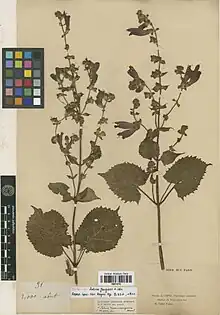| Salvia maximowicziana | |
|---|---|
 | |
| Scientific classification | |
| Kingdom: | Plantae |
| Clade: | Tracheophytes |
| Clade: | Angiosperms |
| Clade: | Eudicots |
| Clade: | Asterids |
| Order: | Lamiales |
| Family: | Lamiaceae |
| Genus: | Salvia |
| Species: | S. maximowicziana |
| Binomial name | |
| Salvia maximowicziana | |
| Varieties | |
| |
Salvia maximowicziana is a perennial plant that is found growing on grasslands, forests, and forest edges in China, at 1,800 to 3,300 m (5,900 to 10,800 ft) elevation. It grows 10 to 90 cm (3.9 to 35.4 in) tall, with circular-cordate to ovate-cordate leaves that are typically 3 to 8 cm (1.2 to 3.1 in) long and 6 to 8 cm (2.4 to 3.1 in) wide. The upper leaf surface is nearly smooth, or lightly covered with hairs, while the underside has glandular hairs on the veins.
The inflorescence is of loose racemes or panicles, with a 2.2 cm (0.87 in) corolla. Salvia maximowicziana var. maximowicziana has a yellow corolla, while Salvia maximowicziana var. floribunda has a purple corolla.[1]
References
- ↑ "Lamiaceae" (PDF). Flora of China. Harvard University. 17: 154–155. 1994. Archived from the original (PDF) on 2011-09-29.
This article is issued from Wikipedia. The text is licensed under Creative Commons - Attribution - Sharealike. Additional terms may apply for the media files.